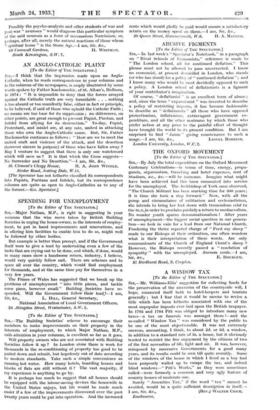A WINDOW TAX [To the Editor of THE SPECTATOR.] Williams-Ellis'
suggestion for collecting funds for the preservation of the aniciuties of the countryside will, I hope, commend itself both to hotel-keepers and tourists generally ; but I fear that it would be unwise to revive a title which has been hitherto associated with one of the most unpopular imposts ever laid upon the British taxpayer. In 1783 and 1784 Pitt was obliged to introduce many new taxes—a tax on funerals was amongst them 1—and the so-called "Window Tax" was considered by the public to be one of the most objectionable. It was not extremely onerous, amounting, I think, to about 2d. or 8d. a window, in addition to a standard rate of 8s. a house, but it obviously tended to restrict the free enjoyment by the citizens of two of the first necessities of life, light and air. It was, however, reimposed by successive Governments for a good many years, and its results could be seen till quite recently. Some of the windows. of the house in which I lived as a boy had been purposely, walled up to escape the tax, and indeed blind windows—" Pitt's Works," as they were sometimes called—were formerly a common and very ugly feature of country houses of moderate size.
Surely "Amenities Tax," if the word " tax " cannot be avoided, would be a quite sufficient description in itself.—






































 Previous page
Previous page